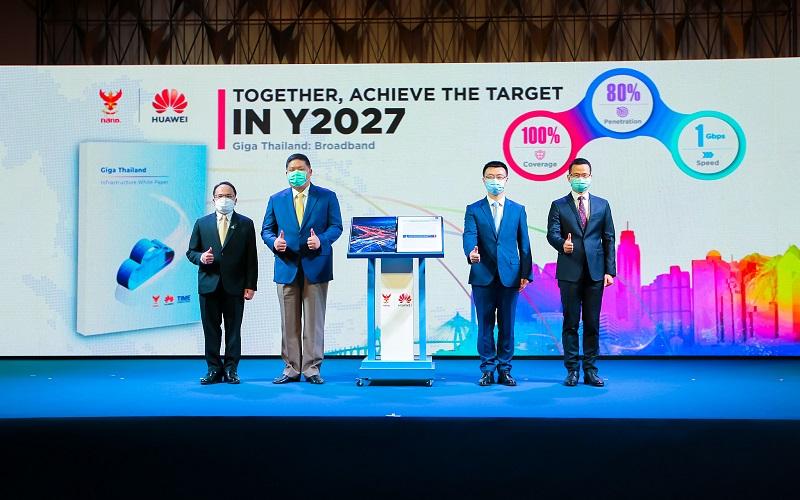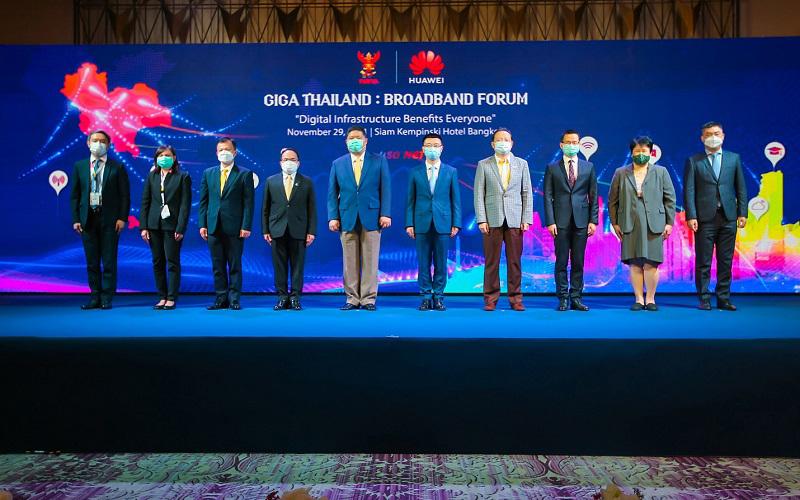
Huawei Partners with NBTC to Develop ‘Giga Thailand’ Digital Infrastructure
[Bangkok, Thailand, November 29, 2021] Today, Huawei and Thailand’s Office of the National Broadcasting and Telecommunications Commission (NBTC) hosted a broadband forum under the theme “Digital Infrastructure Benefits Everyone.” At the forum, Huawei and NBTC emphasized their goal to strengthen the fiber-based infrastructure of Thailand to create a “Giga Thailand”.
Giga Thailand: Broadband Forum
“Fiber-based broadband infrastructure is critical for the development of Thailand’s digital infrastructure in order to drive digital economy,” said Trairat Viriyasirikul, Deputy Secretary General and acting Secretary General of NBTC. “Broadband infrastructure coverage must be accelerated and upgraded to the gigabits-speed standard. The partnership today marks the start of our joint efforts to develop Thailand’s broadband infrastructure, which will in turn drive the country to becoming an ASEAN digital hub and help close the digital divide in the country.”
Joint Release of Giga Thailand Infrastructure Whitepaper

At the event, Huawei and NBTC released their Giga Thailand whitepaper, describing a collection of initiatives about accelerating the fiber-based infrastructure in Thailand. The two sides will collaborate in three key areas. First, they will drive the adoption of fiber broadband as the new country-wide infrastructure of Thailand. Second, the two will work to close Thailand’s digital divide by providing improved access to high-quality broadband. Finally, the joint-effort will pave the way for Thailand’s digital transformation and a better quality life for Thais.
“Digital infrastructure benefits lives,” said Simon Lin, President of Huawei Asia Pacific. “Technologies, such as broadband, 5G, cloud, and AI, keep our society together. 2022 will open a new chapter for digital infrastructure. I believe that with our joint efforts, we can create a fully connected and inclusive Giga Thailand.”
Abel Deng, CEO of Huawei Thailand, added that “the convergence of connectivity and computing will change all industries, whether it is the transportation, finance, or energy industry, and create new value for society. Fiber broadband has become a core infrastructure of the digital economy, similar to water and electricity, and it will be a new driver for social development and economic growth.”
Giga Thailand: Broadband Forum
Puchapong Nodthaisong, Secretary General, Office of the National Digital Economy and Society Commission (ONDE), noted that “fiber-based connectivity is considered a key ICT infrastructure by the Thai government. Thailand has witnessed rapid development of broadband networks and achieved network development goals. This will drive the country’s technological advances and economic and social development as well as rapid growth in the digital economy.”
Dr. Atsuko Okuda, Regional Director of International Telecommunication Union, Regional Office for Asia and the Pacific, said: “At the same time, the COVID-19 pandemic has highlighted the urgency of accelerating digital transformation. This means advancing the goals and targets of ITU’s Connect 2030 Agenda, leaving no one behind, and ensuring the creation of a safe and enabling environment towards digital transformation and innovation. Our Connect 2030 Agenda contributes to the UN Decade of Action to achieve the 2030 Agenda for Sustainable Development and SDG9 in particular: Build resilient infrastructure, promote inclusive and sustainable industrialization and foster innovation. Digital technologies, and the work of ITU, are vital to achieve all 17 SDGs.”
Vichaow Rakphongphairoj, President of Telecommunications Association of Thailand under the Royal Patronage said that “at the moment, Thailand broadband is facing many key issues such as a low fiber penetration rate, especially to old buildings and remote areas, wide disparity of internet speeds, and disorganized telecommunication cables. Thai government should lay down measures to promote fiber deployment because fiber infrastructure will drive the future digitalization, enabling high speed broadband, 5G mmWave and the cloud.”
}})